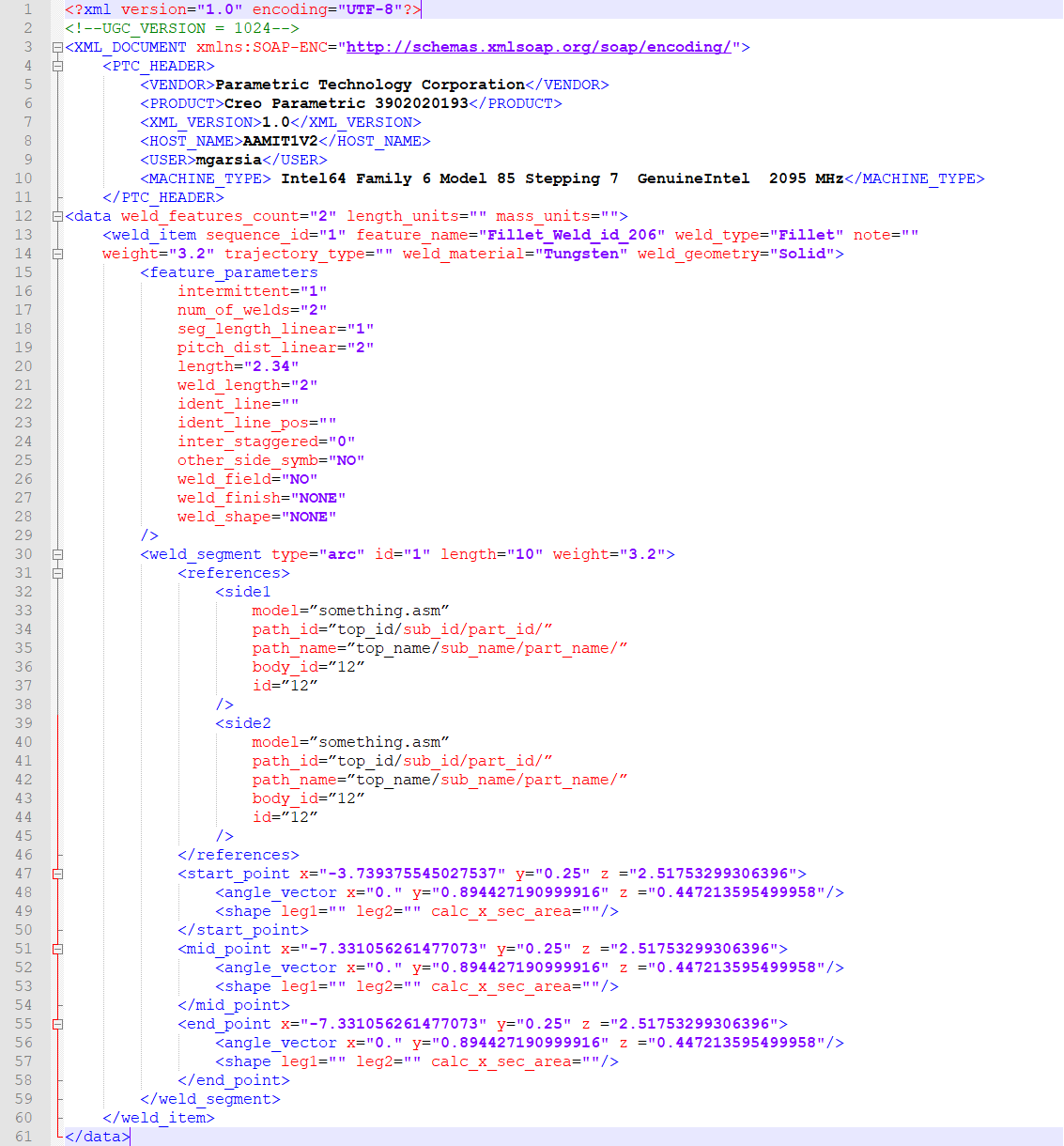To Export Fillet Weld Information
Click > > to export weld feature information to an XML file. Additional information is exported for fillet welds.
Fillet weld information that is exported
For fillet welds, the following elements are exported:
• data—Top-level element.
Contains the following attributes:
weld_features_count—Number of welding features for which the information is exported.
length_units—Units used for length in the model.
mass_units—Units used for mass in the model.
◦ weld_item—Contains the weld feature, parameters, and segment information.
Contains the following attributes:
sequence_id—Sequence ID of the feature.
feature_name—Name of the feature.
weld_type—Type of weld: fillet, groove, plug, slot, or spot weld.
note—Note that is specified on the Symbol tab of the feature.
weight—Calculated mass of the weld feature.
weld_material—Assigned material.
weld_geometry—Geometry representation: solid, surface, or light representation.
trajectory_type—Type of trajectory: automatic or manual.
▪ feature_parameters—List of feature parameters and their values.
▪ weld_segment—Reference and trajectory information for the welded joint. Looks for information in the following order:
a. Automatic trajectory.
b. Manual (user-defined) lightweight trajectory, if automatic trajectory is not found. For manual trajectory, breaks the chain into line, arc, or curve segments, and reports start point, midpoint, and end point information on these segments.
c. When automatic or manual trajectory is not detected, reports insufficient data.
Contains the following attributes:
type—Type of segment: line, arc, or curve.
id—ID of the segment.
length—Length of the segment.
weight—Weight of the segment.
▪ references—Contains the side references for the joint.
▪ side1—Contains information about the side 1 references for the joint.
Contains the following attributes:
context_model—Name of the model in which the feature was created.
path_id—Path to the part (top_id/sub_id/part_id).
path_name—Path to the part by IDs (top_id/sub_id/part_id).
welded_model—Name of the model to which the references belong.
body_id—ID of the body.
type—Geometry type of the referenced geometry.
id—ID of the referenced geometry.
▪ side2—Contains information about the side 2 references for the joint. The attributes are the same as for side1.
▪ start_point—Contains information about the start point.
Contains the following attributes:
x—Value of the start point along the x-axis relative to the default coordinate system.
y—Value of the start point along the y-axis relative to the default coordinate system.
z—Value of the start point along the z-axis relative to the default coordinate system.
▪ angle_vector—Angle vector of the weld torch at the start point, relative to the default coordinate system.
▪ shape—Weld shape at the start point.
Contains the following attributes:
leg1—Leg 1 value of the fillet weld cross section.
leg2—Leg 2 value of the fillet weld cross section.
calc_x_sec_area—Area value of the cross section.
▪ mid_point—Contains information about the midpoint.
Contains the following attributes:
x—Value of the midpoint along the x-axis relative to the default coordinate system.
y—Value of the midpoint along the y-axis relative to the default coordinate system.
z—Value of the midpoint along the z-axis relative to the default coordinate system.
▪ angle_vector—Angle vector of the weld torch at the midpoint, relative to the default coordinate system.
▪ shape—Weld shape at the midpoint.
Contains the following attributes:
leg1—Leg 1 value of the fillet weld cross section.
leg2—Leg 2 value of the fillet weld cross section.
calc_x_sec_area—Area value of the cross section.
▪ end_point—Contains information about the end point.
Contains the following attributes:
x—Value of the end point along the x-axis relative to the default coordinate system.
y—Value of the end point along the y-axis relative to the default coordinate system.
z—Value of the end point along the z-axis relative to the default coordinate system.
▪ angle_vector—Angle vector of the weld torch at the end point, relative to the default coordinate system.
▪ shape—Weld shape at the end point.
Contains the following attributes:
leg1—Leg 1 value of the fillet weld cross section.
leg2—Leg 2 value of the fillet weld cross section.
calc_x_sec_area—Area value of the cross section.
XML file for fillet welds

Video
Watch a video about exporting fillet weld information to an XML file.
 Export
Export